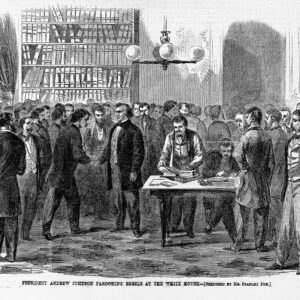Article II, Section 2, Clause 1 of the U.S. Constitution authorizes the President to pardon anyone for federal crimes, except in cases of impeachment.
During the last few decades, the position of the Department of Justice has been that “in the exercise of the pardoning power, the president is amenable only to the dictates of his own conscience, unhampered and uncontrolled by any person or branch of government”. Can we rely on Trump’s “conscience” for him to faithfully execute his powers?
The President has the authority to disregard a jury conviction and ignore a guilty plea and grant full clemency. Pardons are never granted because a person is innocent. In 1915, the Supreme Court held in Burdick v. U.S. that accepting a pardon is an admission of guilt.
Sometimes pardons exploit political advantage and many times are granted to gain support from a particular group. However, the rationale of the constitutional framers’ original intent of the presidential pardon was to restore tranquility to the country after times of strife; for example, pardoning Confederate soldiers after the Civil War.

The framers embraced the power to pardon from England’s monarchical system of government and included it in our Constitution. However, even among them there was disagreement on the subject. George Mason, Virginia’s representative to the Constitutional Convention, refused to sign the Constitution because of his opposition to a powerful central government and to the presidential pardon power. Mason argued that, “The president ought not to have the power of pardoning, because he may frequently pardon crimes which were advised by himself. It may happen, at some future day, that he will establish a monarch, and destroy the republic…”
Granting monarchical powers to a president is totally inconsistent with a Constitution that was based on a revolution seeking freedom from the autocratic rule of a king. The American Revolution ousted the king who had absolute power; to then give a portion of that absolute power to the President over cases involving crimes against the United States is the antithesis of a Republic.
At the end of the Constitutional Convention in 1797 Benjamin Franklin was asked whether America had a republic or a monarchy. He answered, “A republic…if you can keep it.” The idea of our republic therefore, was to limit the powers of the President, not to grant monarchical power to a president that puts the republic in jeopardy.
Article II of the Constitution grants Executive power to the president. Articles I and III grant Congressional and Judicial authority. The three equal branches of government create a system of “Checks and Balances” to prevent one branch of government from having too much power.
Further, the Bill of Rights specifically delineates individual rights and protections to prevent government from becoming oppressive, and the Tenth Amendment protects State rights. In short, and to be clear: the Founding Fathers did not want another King under any circumstances.
However, it didn’t take long for the pardon power to mutate into a political favor, and to start to resemble absolute power of the president, thus making him reminiscent of a king. And precisely because of the controversial nature of pardons and commutations which many citizens came to disagree with, the President would commonly exercise this power at the end of his term to avoid the inquiries and criticism of his “clemency”.
For example, on his last day in office, Bill Clinton commuted the sentence of domestic terrorist Susan Rosenberg and with three days left in his second term Barack Obama commuted former soldier Chelsea Manning’s 35-year sentence to seven years of time already served for giving classified military secrets to Wiki Leaks. It may be surprising to learn that all presidents except Garfield and Harrison, who died early into their terms, have granted pardons.
Every president takes an oath to faithfully execute the duties of the Office. Throughout America’s history, some would argue that the Presidential pardon power has been abused and often sold by the president like an auctioneer looking for the highest bidder. It leads to partisan favoritism in the administration of justice which is a direct contradiction to the tenets of American jurisprudence which declare that justice must be fair and impartial for all.

Is it fair and impartial for a president to set aside a conviction that was based on due process of law or to ignore a guilty plea and pardon an individual? Is the ability of a president to pardon himself a faithful execution of office? In American jurisprudence a defendant cannot be his own judge and no one is above the law. Clearly, the power of a pardon is not in harmony with those legal principles.
We can argue that promising future pardons to entice federal crimes or for an individual to stay loyal to the president subsequent to the offences, is hardly a faithful execution of the Office of President. Instead, this is a strategy to prevent cooperation with federal prosecutors or an impeachment inquiry. Of course, here we are thinking of Paul Manafort, Michael Flynn and Roger Stone. This behavior by the president would be akin to “Obstruction of Justice”.
In the alternative, when a pardon is granted and accepted, individuals can no longer assert their Fifth Amendment protection against self-incrimination in the matter because they are no longer criminally accountable. In effect, if Manafort, Flynn and Stone are issued pardons they could be compelled to testify against themselves in order for prosecutors to obtain evidence. Refusal could lead to being jailed for contempt of court.
In 1927, the Supreme Court stated in Biddle v. Perovich that a presidential pardon “is not a private act of grace”, adding, “When granted, it is the determination of the ultimate authority that the public welfare will be better served.”

In his three terms as president, Franklin D. Roosevelt issued 3,687 pardons, the most in America’s 244-year existence. Gerald Ford granted a pardon to former President Richard Nixon for Watergate-related crimes and Iva Toguri D’Aquino (“Tokyo Rose”) who had been convicted of treason. Breaking with the tradition of postponing such pardons till the end of his tenure, Donald Trump has already pardoned Army Officer Mathew L. Golsteyn, accused of killing an unarmed POW in Afganistan, Lieutenant Clint Lorance who was convicted of second degree murder of two Afghan men while serving in Afghanistan, and commuted the sentence of former Illinois Governor and “Apprentice” contestant Rod Blagoyovich, who was impeached for abuse of power and convicted of extortion and corruption related charges.
The vast majority of pardons are not consistent with the original intent of the constitutional framers. They were not granted to restore tranquility to the nation, as originally intended. Is the public welfare better served by pardoning corrupt politicians, war criminals, spies and terrorists? Does clemency for Paul Manafort, Roger Stone, Michael Flynn or a posthumous pardon for Jeffrey Epstein better serve the public welfare?

Interestingly, to show this power of pardon for the mockery and disrespect for the criminal justice system that it is, every year the president in satirically-comedic style grants a pardon to a turkey on Thanksgiving. Given the controversial nature of the power of pardon, and the murky implementation of this power, the question is: Should Congress strip POTUS of both the power to pardon and commute sentences?
Today, an even more disturbing question emerges on the subject of pardons. After the November election, whether he wins or loses, will Trump hand out pardons and commutations to his cronies and comrades like candy on Halloween to ‘trick-or-treaters’ dressed up as Jared Kushner, Wall Street swindlers, chiseling CEO’s, scamming stock traders, cozening executives and Russian Intelligence operatives?












